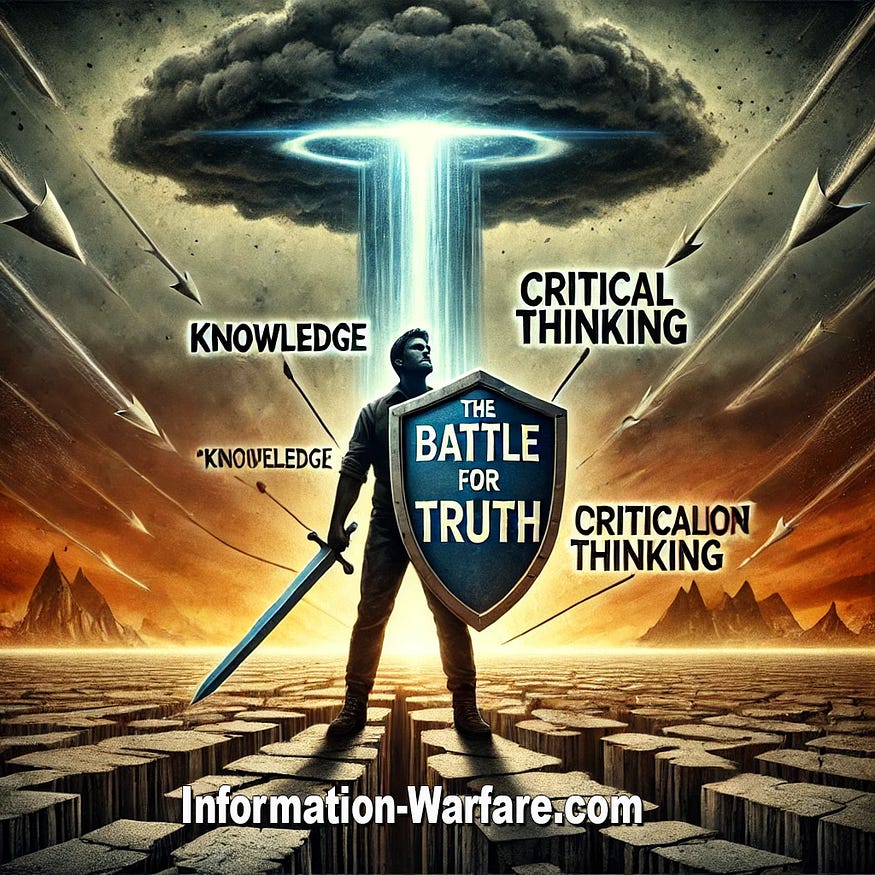Winning the Information War:
Winning the Information War:

A Path to an Informed Electorate
Introduction: In the digital age, the information war has become one of the most critical battles we face. With the proliferation of social media, 24-hour news cycles, and the rapid spread of information, distinguishing fact from fiction has never been more challenging. Misinformation and disinformation have the potential to destabilize democracies, incite violence, and erode public trust in institutions. The only way to win this war is by cultivating an informed electorate capable of discerning truth from falsehood. This article explores strategies to achieve this goal and examines how the information war will ultimately end.
The Nature of the Information War: The information war is characterized by the deliberate spread of false or misleading information to influence public opinion, sow discord, and achieve political or ideological goals. Misinformation, which refers to false information spread without malicious intent, and disinformation, which is intentionally deceptive, are both weapons used in this battle. These tactics are employed by state actors, non-state entities, and even individuals with their own agendas.
The rise of social media platforms has amplified the reach of misinformation and disinformation. Algorithms designed to maximize engagement often prioritize sensational content, making it easier for false information to spread rapidly. Additionally, the fragmentation of media sources has led to the creation of echo chambers, where individuals are exposed only to information that reinforces their preexisting beliefs.
The Consequences of the Information War: The impact of the information war is profound and far-reaching. It can undermine democratic processes, erode trust in government and media, and polarize societies. In extreme cases, it can lead to violence, as seen in various conflicts fueled by misinformation. The consequences are not limited to the political sphere; public health, environmental issues, and social cohesion are also at risk.
Strategies to Win the Information War
Media Literacy Education:
One of the most effective ways to combat misinformation and disinformation is through media literacy education. By teaching individuals how to critically evaluate sources, recognize bias, and verify information, we can empower them to make informed decisions. Media literacy should be integrated into school curricula from an early age and continue throughout adulthood. Workshops, online courses, and public awareness campaigns can also play a vital role in raising awareness.
Fact-Checking and Verification:
Fact-checking organizations have become essential in the fight against misinformation. These organizations investigate and verify claims made in the media, providing the public with accurate information. Media outlets should collaborate with fact-checkers to ensure that their reporting is reliable. Additionally, tech companies can implement more robust algorithms to flag and reduce the spread of false information.
Promoting Transparency and Accountability:
Governments, media organizations, and tech companies must prioritize transparency and accountability in their operations. For governments, this means providing clear and accessible information to the public, especially during crises. Media organizations should adhere to strict journalistic standards and be transparent about their sources and editorial processes. Tech companies, particularly social media platforms, need to be held accountable for the content they allow on their platforms and the algorithms that promote it.
Strengthening Independent Journalism:
Independent journalism is a cornerstone of a healthy democracy. Supporting investigative journalism and independent media outlets can help counterbalance the influence of biased or controlled media. Public funding, grants, and subscriptions are ways to sustain independent journalism. Additionally, ensuring the safety and security of journalists is crucial in allowing them to report freely without fear of retribution.
International Cooperation:
The information war is a global issue that requires international cooperation. Governments should work together to establish norms and agreements to combat the spread of disinformation, particularly by state actors. This can include sanctions, diplomatic efforts, and the sharing of intelligence on disinformation campaigns. International organizations like the United Nations and the European Union can play a coordinating role in these efforts.
Empowering the Public:
Ultimately, winning the information war requires empowering the public to be critical thinkers and active participants in the democratic process. This includes encouraging civic engagement, fostering open dialogue, and creating spaces for diverse perspectives. By promoting a culture of curiosity and inquiry, we can build resilience against misinformation.
How the Information War Will End
The information war will not end with a single victory but through the gradual development of an informed and discerning electorate. As media literacy improves, fact-checking becomes more widespread, and transparency is prioritized, the influence of misinformation and disinformation will wane. However, this is an ongoing process that requires constant vigilance and adaptation to new challenges.
The ultimate goal is not just to win the information war but to create a society where the truth prevails, and democratic institutions are strengthened. The end of the information war will come when citizens are equipped with the tools and knowledge to navigate the complex media landscape and make decisions based on accurate and reliable information.
Conclusion: Winning the information war is essential for the survival of democratic societies. By focusing on education, transparency, independent journalism, and international cooperation, we can create a more informed electorate capable of distinguishing information from misinformation. The end of the information war will not be marked by a clear victory but by the gradual emergence of a society where truth, reason, and critical thinking are valued above all else.

